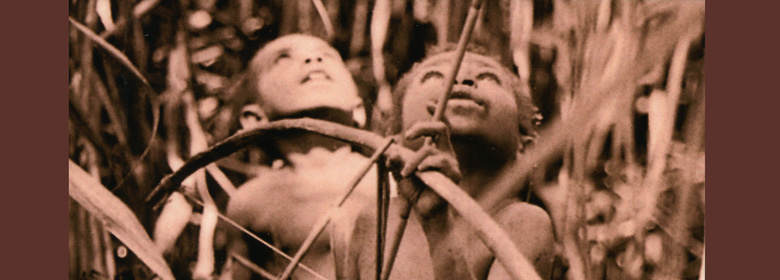|
Chapter 3. Five Years Later: An
Act of Courage
It is for a noble end that
the brave man endures and acts.
—Aristotle, Nicomachean
Ethics
One day Gwe and his
friend Fovot were hunting little birds in the nearby forest. Gwe pointed
his child’s bow upward as he searched the trees for birds. His arrow shone
in the light coming through the leaves.
Fovot had a little
branch in one hand which he shook, hoping to attract the birds. The idea
had come to him on his own. But the boys had been completely unsuccessful
that morning, and, discouraged, Fovot gave up and went home.
Gwe decided to go
and sit behind the screen of leaves and branches he constructed near a
red flowering tree where birds came to eat. It grew a short distance from
land that his father owned.
Gwe crouched behind
the screen a long time without seeing a bird. He was invisible in the dark
there. Suddenly he heard the sound of angry shouting. He stood up for a
better look and then climbed up the bird-screen of twigs and leaves for
a better view. Looking out, he saw men on his father’s land. They were
in tense semi-crouching positions. These men had been for some time secretly
clearing land that his father was planning to use.
His Uncle Yug-wek-kek
had paid them to do this. But Gwe’s father, Itulieng, had appeared by surprise—and
Yug-wek-kek was shouting at him: "This land is mine!"
"No it isn’t," shouted
Itulieng.
"Yes it is," shouted
Yug-wek-kek. "You left it a long time ago and now I’ve improved it. Who
built the fence? Did you? Who cleared the earth? Did you? And who’s going
to plant and eat the sweet potatoes? Not you!"
Yug-wek-kek looked
round at the men helping him build the fence and smiled. "Isn’t that right,
men?" The men shuffled but didn’t say no. Gwe, peering out between the
leaves, felt they looked ashamed.
Gwe’s father began
to shout—and threaten Yug-wek-kek!
Yug-wek-kek shouted
for help, and Father shouted for help, and Gwe saw men running to help
Yug-wek-kek. But no men came to help his father.
Yug-wek-kek’s men—some
were relatives—slowly paraded before the abandoned Itulieng with their
bows and arrows slung across their shoulders. Itul1 was crouched down, now, and one by one they strolled past him and shouted
at him.
Hidden behind his
screen, Gwe’s knees shook. He was afraid to move. He hoped they wouldn’t
see him—if they caught him they would kill him like a bug.—No, he was invisible
inside the bird blind. If the birds couldn’t see him the men couldn’t.
He could just sit quietly inside, in the dark, and nobody would ever know.
His teeth were chattering.
"Nobody would ever know," a voice seemed to croon in his head. "NO," he
shouted inside himself. "Help, help, help me," he cried out to his grandfather
in the spirit world. "Grandfather help me!—It’s Gwe! … I can’t desert my
father!" He felt immediately warmer, and then he thought, as if a light
came into his mind, of the brush turkey who saved her chicks by luring
away the hunter. "I can get the big men to look at me so my father can
run away," he thought. "The men don’t like Yug-wek-kek. They won’t hurt
me."
Gwe burst out from
the leaves, and, running fast with his little bow, and a tiny bird-arrow
in firing position, he shouted at the men: "Leave my father alone!"
The men started to
laugh, and in an instant his father was on his feet with a hunting arrow
drawn tight and pointed at Yug-wek-kek’s chest just an arm’s length away.
The men stopped laughing.
Now Yug-wek-kek was in the weaker position. Itul could kill him in a moment.
"This land is mine," said Itul. Yug-wek-kek almost choked as he said, "Yes,
it’s yours."
Itul lowered his arrow
and together the father and son returned home together.
But Yug-wek-kek kept
the land. Itulieng had escaped with his life, but not with his land. The
men who were helping Yug-wek-kek fence the property completed their job.
Then, they all dug open a big earth oven on that land—a smoking mound of
earth containing pounds and pounds of rich pandanus nuts, provided by Yug-wek-kek.
He often had invited
the men to make fences for him while a smoking earth oven awaited them,
using their labor to make himself rich. And nobody could stop him from
taking land not his own. The custom was for each clan to distribute land
according to need. But Yug-wek-kek was greedy, and his gang made him powerful
as they enjoyed their power, being friends with a man who was very dangerous
when he didn’t get what he wanted.
As the sun was setting
that night, and the high song of the cicada sounded in the air, Gwe’s father
said to his son: "You are very small, and your front teeth haven’t yet
fallen out, but what you did was big. I will never forget it."
He took out a little
string which he made that day from soft inner bark and showed it to Gwe.
In New Guinea, a boy child of Gwe’s age was as naked as the day he was
born—though the small girl children wore a little fringe of grass. Then,
at a certain age, the boy gets a string to wear around his waist. And thus—he
joins the adult world of the clothed.
Therefore, honoring
his son, Gwe’s father gently tied the little string around the boy’s rotund
waist. And so Gwe was given the cord a grown-up boy wears, and he was very
proud.
1People's names are
affectionately shortened by people close to them. Itulieng becomes Itul.
back
to top
|



